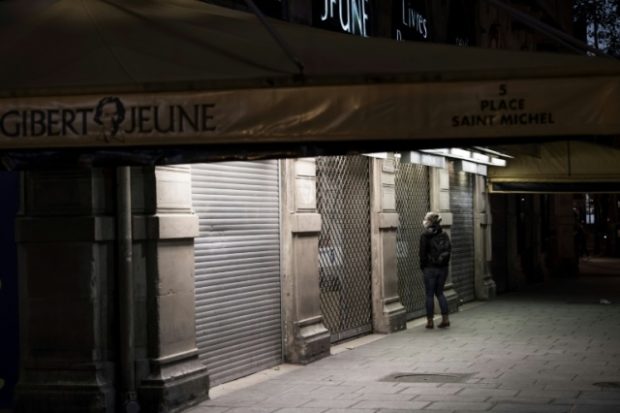French bookworms denied their fix in lockdown

Unlike in Belgium or Switzerland, which have issued their own stay-at-home orders, bookshops were among businesses classified “non-essential” under France’s latest lockdown decree. Image: AFP/ALAIN JOCARD.
First, bookstores across literature-obsessed France were ordered to close in a new lockdown seeking to curb an alarming rise in COVID-19 cases.
A few days later, bibliophiles were dealt a further blow as the government banned supermarkets, too, from selling books in a bid to parry claims of unfair competition.
Bookworms were left befuddled as store owners, authors and local politicians fumed.
“I think the decision to close the bookshelves in supermarkets is stupid. It robs people in lockdown of culture,” said Sylvie Lagrange, an avid reader who visited her library in the southern suburbs of Paris to “stock up” two days before the start of a long month of lockdown due to last until end of November.
She was not alone. Card carriers flocked to public libraries last week before they, too, were closed — some 8,000 books were taken out in just a few hours on Thursday at the library in Villeneuve d’Ascq, just outside Lille along the border with Belgium.
“We lent out 8,000 per week” before the latest lockdown, the library’s director, Helene Brochard, told AFP.
France has some of the highest book readership figures in the world, studies show, and one of the densest networks of bookstores.
The SLF union of French bookstores says the country has some 3,300 outlets — one for every 20,300 people.
Non-essential?
Unlike many of its neighbors such as Belgium that have issued their own stay-at-home orders, France decreed bookshops among “non-essential” businesses under the latest lockdown rules.
Also closed are hairdressers and barbers, toy stores, perfumeries, florists, cinemas and malls — even as many clothing stores, speciality food retailers, electronics specialists and others were allowed to remain open.
But it was access to books that mobilized protests in a country with some 16,000 public libraries, as well as numerous prizes for authors and television programs dedicated to literary musings.
“Politicians boast a great deal about the idea that France is a nation of readers and bookstores… But just like that, we realize this was all hot air,” said acclaimed author Sylvain Tesson of the government’s decision.
Since the lockdown entered into force last Friday, Oct. 30, anger has grown, with a petition to President Emmanuel Macron which had garnered more than 188,000 signatures by Wednesday, Nov. 4.
There are also mutterings about flouting the ban and growing calls to boycott Amazon, which now threatens to reap the lion’s share of book purchases.
The announcement of literary prizes, including the prestigious Prix Goncourt, was postponed by organizers until bookstores reopen.
Under pressure, the government relented, but not in the way expected.
On Sunday, Nov. 1, just days after the initial announcement, Prime Minister Jean Castex said that instead of allowing bookstores to reopen, the government would ban supermarkets, too, from selling books.
‘Don’t buy on Amazon’
Culture Minister Roselyne Bachelot announced Monday, Nov. 2, that postage would be reduced for bookshops to mail orders to readers in a bid to prevent large e-commerce companies taking over the field.
But the measures did little to appease bookstore owners who already saw their turnover plummet by some 95% in France’s first lockdown, from March to May this year.
Outrage spread even to the political class, with mayors launching a campaign for the reopening of bookstores and Anne Hidalgo of Paris accusing the government of making a “sacrifice” of culture and urging readers: “Don’t buy on Amazon.”
For its part, the SLF urged Macron in a statement to remember “that the book is a product unlike any other: it is a good that must be protected by the nation, under all circumstances.”
“Bookstores play a unique role in… transmitting culture and knowledge,” it continued. “They are also one of the most effective ramparts against ignorance and intolerance.”
Brochard said she was “flabbergasted” by the decision to also ban book sales at supermarkets, which remain open throughout the lockdown.
“It’s incredible; it makes the book a totally forbidden product!” she said. “Sure, there is a serious health situation and a need to protect the staff of bookstores and libraries. But the message being sent is catastrophic.”
To keep up the pressure, French authors will switch on the lights of a bookstore of their choice at 3 p.m. daily in a protest campaign launched by Tesson and Hidalgo. CC
RELATED STORIES:
Damascus fair offers hope for exports-starved Aleppo artisans
COVID-19 pandemic sees Europeans heading back to local shops